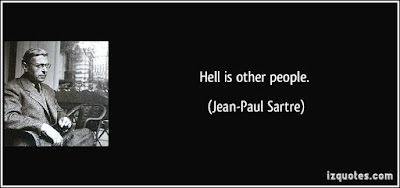The relationship spectrum of self/other is ruled by the two opposing poles of fragmented self and whole self and all intimate, non-obligatory relationships (not connected by blood) fall between those two poles (and even obligatory familial relationships tend to adhere to it by degrees). Note that both poles are extreme opposites, but all intimate relationships lean more toward one or the other pole.
FRAGMENTED SELF: You fail to acknowledge your insecurities and, hence, fail to engage the process of healing and recovery. Your 'ego-self' is scattered in disparate and conflicting pieces and you need another to complete you, make you whole and, hence, make you happy.
You fear solitude and your happiness is primarily other-dependent. Unhappiness is the fault of the other who can only fail in the burden of that impossible role. Failure drives you to seek another for completion in a never ending saga of failed relationships through a process of serialized monogamy. Due to need, there is a desperation driving choices, ultimately resulting in consistently poor choices being made.
WHOLE SELF: You acknowledge your insecurities and are in the never-ending process of healing and recovery. There is a holistic center to your 'ego-self' based on rigorous self-inquiry and a progressive absence of denial. You revel and grow through your periods of solitude and your happiness is self-developed and self-maintained. You want another as an addition to your happiness, but it is not a necessary aspect of your continued happiness. There is a sense of peace surrounding choice, resulting in fewer bad choices in association with intimate relationships because there is no necessity driving choices made.
A fragmented union attracts and supports further fragmentation, while a union of wholeness attracts and supports further wholeness. The operative terms are need and want, which makes all the difference in relation to choice and who you choose to be involved with. A whole individual is unlikely to intimately orient himself to the reality of another's fragmented state as the emotional exhaustion would be too draining eventually requiring separation.
However, fragmented individuals tend to thrive on mutually reciprocating levels of dramatic engagements, resulting in intense emotionality, psychological instability and frequent separations, reunions and eventually termination. Fragmented relationships are always terminal because they are constructed from disordered mental states.
To inform someone who is fragmented to avoid intimate relating for a period of time, in order to engage a personal healing process, is to provoke deep seated fears of inadequacy, because the basic means of validation is hinged almost exclusively on the other and their brain is hard-wired to seek out that stimulus, as opposed to any self-validation. When that stimulus is unavailable, a period of desperation may arise, resulting in the seeking of stimulus outside the committed/exclusive relationship, which often precedes the end of that relationship.
A whole individual who has experienced a failure will naturally engage a period of introspection as a means of regaining peace and stability and this may entail an extended time of solitude and introversion. Any desperation is nullified simply because there is never a need to be in an intimate relationship.
"Nobody stays. Eventually everyone leaves. But you are the only one who will never leave you or that you will never lose." -Anonymous
Dysfunctional patterns not identified and worked out in one relationship, will be carried over to the next. Such is the nature of neuro-chemistry and the hard-wiring of brain circuits that instigate repetitive behavioral patterns and addictions.
From a rational perspective, the very conception that another can make you happy borders on absolute absurdity. The very fact that one can make you experience any emotion at all is absurd, since the very mechanism of emotion is encased in a cranial shell and unavailable to another's manipulation (other than brain surgery in which electric shocks proved capable of provoking various emotions) Yet, the collective burden of this belief is the underlying fairy-tale foundation for most committed relationships and the chief variable in the failure of most relationships.
Basically, if you are not at peace within the mental states that emerge from your periods of extended solitude, do you really think you will find that peace in the arms of another? Or will you merely find brief periods of respite that eventually lose the ability to sustain?
Hence, don't go there until you're happy here:
From a rational perspective, the very conception that another can make you happy borders on absolute absurdity. The very fact that one can make you experience any emotion at all is absurd, since the very mechanism of emotion is encased in a cranial shell and unavailable to another's manipulation (other than brain surgery in which electric shocks proved capable of provoking various emotions) Yet, the collective burden of this belief is the underlying fairy-tale foundation for most committed relationships and the chief variable in the failure of most relationships.
Basically, if you are not at peace within the mental states that emerge from your periods of extended solitude, do you really think you will find that peace in the arms of another? Or will you merely find brief periods of respite that eventually lose the ability to sustain?
Hence, don't go there until you're happy here:




No comments:
Post a Comment